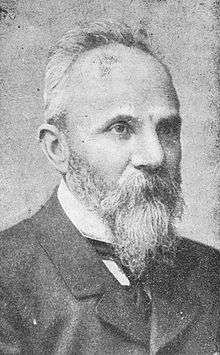Edoardo Perroncito
Edoardo Bellarmino Perroncito (10 March 1847, Viale in the Province of Asti – 4 November 1936) was an Italian parasitologist. He was the father of pathologist Aldo Perroncito (1882–1929).

He earned his degree in veterinary medicine, and in 1879 he became a professor of parasitology to the Faculty of Veterinary Medicine at the University of Turin.[1]
Remembered for his extensive research of Ancylostoma duodenale (hookworm), in 1880 he determined that hookworm was the cause of anemia being suffered by workmen building the St. Gotthard railway tunnel.[2][3] He was the first to recommend using an extract of the male fern as a remedy for the disease.[4][5]
Selected writings
- L'anemia dei contadini, fornaciai e minatori in rapporto coll'attuale epidemia negli operai del Gottardo. Studi ed osservazioni, profilassi e cura, 1881 - The anemia of farmers, miners and kiln workers in relation to the epidemic of the St. Gotthard workers. Study and observation, prevention and remedy.
- La Tubercolosi dei bovini in rapporto alla tubercolosi umana, 1903 - Tuberculosis in cattle in relation to human tuberculosis.
- La malattia dei minatori, dal S. Gottardo al Sempione, una questione risolta, 1909 - The disease of miners, St. Gotthard to Simplon, a settled issue.[6]
References
- Statement based on a translation from an equivalent article at the Italian Wikipedia
- Antimicrobial Drugs: Chronicle of a twentieth century medical triumph by David Greenwood
- Stanford.edu Hookworm: Ancylostoma duodenale and Necator americanus
- Who Goes First?: The Story of Self-Experimentation in Medicine by Lawrence K. Altman
- Treccani.it (biographical information)
- WorldCat Titles (publications)
- IPNI. Perronc.
External links
- Science Photo Library (photograph of Perroncito).
This article is issued from Wikipedia. The text is licensed under Creative Commons - Attribution - Sharealike. Additional terms may apply for the media files.